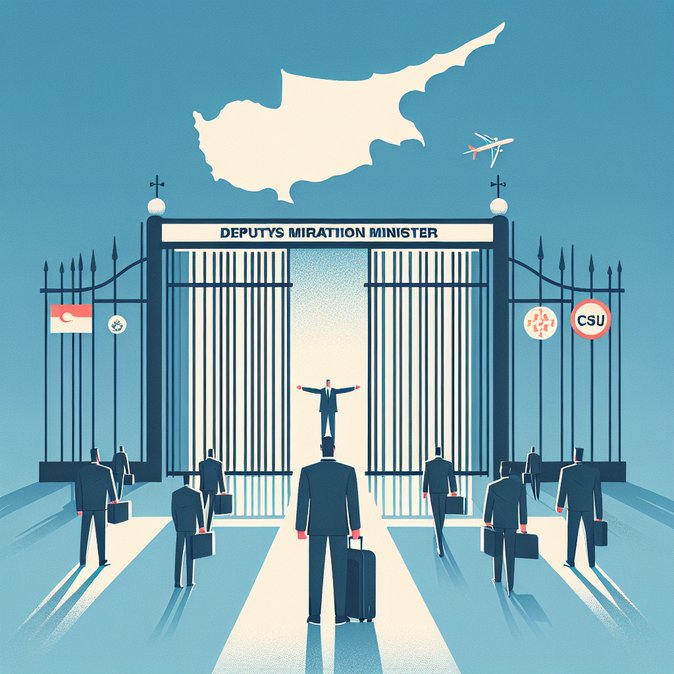
Speaking to reporters after a meeting with EU Home-Affairs Commissioner Magnus Brunner in Brussels on 19 November, Deputy Minister for Migration and International Protection Nikolas Ioannides declared that Cyprus has completed the technical work needed to plug into the Schengen acquis and expects the EU’s evaluation mission to give the green light in 2025, paving the way for political approval in 2026.
Schengen accession would abolish systematic passport control for flights and ferries between Cyprus and 27 other Schengen members—an historic shift for a country whose external border management has been complicated by the island’s division since 1974. Ioannides stressed that joining Schengen would not change the legal status of the UN-patrolled Green Line; travellers crossing between the Republic of Cyprus and the north will still be subject to the existing Green-Line Regulation.
![Cyprus says it is technically ready for Schengen; aims for full accession in 2026]()
For multinational companies, Cyprus’ admission would remove one of the last remaining visa frictions inside the EU’s internal market. EU and many third-country nationals holding Schengen multiple-entry visas would gain seamless access to the island for short-term business trips, while Cypriot passport holders could avoid secondary screenings at major hubs such as Frankfurt, Paris CDG and Amsterdam Schiphol, cutting connection times. The reform is also expected to boost the island’s burgeoning head-office and fintech sectors, which rely on frequent executive travel to mainland Europe.
From a compliance standpoint, Cyprus has already deployed a national Visa Information System that mirrors the EU’s central VIS and has linked its border posts to the Entry/Exit System to capture biometrics and overstays—investments totalling €32 million, co-funded by the EU Internal Security Fund. The government is now drafting contingency plans to expand staffing for passport-free airside arrivals, upgrade automated e-gates and roll out carrier-liaison training for Advanced Passenger Information (API) uploads.
Challenges remain: several member states have privately raised concerns about the island’s historic ‘golden-passport’ scandal and its position on eastern Mediterranean migration routes. Ioannides said Nicosia is engaging in “frank bilateral dialogue” to address security and data-protection questions and is leveraging its upcoming EU Council presidency (January–June 2026) to build goodwill. If Cyprus succeeds, it will become the first new Schengen member since Croatia joined in 2023, further integrating the EU’s southeastern periphery.
Schengen accession would abolish systematic passport control for flights and ferries between Cyprus and 27 other Schengen members—an historic shift for a country whose external border management has been complicated by the island’s division since 1974. Ioannides stressed that joining Schengen would not change the legal status of the UN-patrolled Green Line; travellers crossing between the Republic of Cyprus and the north will still be subject to the existing Green-Line Regulation.

For multinational companies, Cyprus’ admission would remove one of the last remaining visa frictions inside the EU’s internal market. EU and many third-country nationals holding Schengen multiple-entry visas would gain seamless access to the island for short-term business trips, while Cypriot passport holders could avoid secondary screenings at major hubs such as Frankfurt, Paris CDG and Amsterdam Schiphol, cutting connection times. The reform is also expected to boost the island’s burgeoning head-office and fintech sectors, which rely on frequent executive travel to mainland Europe.
From a compliance standpoint, Cyprus has already deployed a national Visa Information System that mirrors the EU’s central VIS and has linked its border posts to the Entry/Exit System to capture biometrics and overstays—investments totalling €32 million, co-funded by the EU Internal Security Fund. The government is now drafting contingency plans to expand staffing for passport-free airside arrivals, upgrade automated e-gates and roll out carrier-liaison training for Advanced Passenger Information (API) uploads.
Challenges remain: several member states have privately raised concerns about the island’s historic ‘golden-passport’ scandal and its position on eastern Mediterranean migration routes. Ioannides said Nicosia is engaging in “frank bilateral dialogue” to address security and data-protection questions and is leveraging its upcoming EU Council presidency (January–June 2026) to build goodwill. If Cyprus succeeds, it will become the first new Schengen member since Croatia joined in 2023, further integrating the EU’s southeastern periphery.


